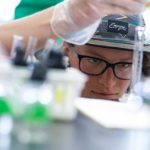Think Deeper with a B.S. Degree in Sustainability Studies from Northern Vermont University
At Northern Vermont University, we’re motivated by challenge, and today’s world is filled with challenges. We’re faced with some of the toughest issues humankind has ever faced in terms of natural resources, the environment, and economic inequality. Students in NVU-Lyndon’s sustainability studies program look for lasting solutions to these problems to bring about a better world for future generations, environmentally, economically, and socially.
Classroom and Hands-On Learning
Our program will give you a solid foundation in environmental science with a combination of classroom learning and real-world experiences. You will benefit from our small classes and personal attention from your professors. Off campus, Vermont’s active renewable energy and sustainable agriculture communities provide many options for you to gain hands-on experience in internships and other activities with leaders in the field. You’ll graduate prepared for career opportunities in renewable energy, sustainable food production, and other sustainable-living fields.
First-Year Integrated Sciences Semester Sets NVU Apart
All incoming NVU-Lyndon students pursuing a B.S. degree in sustainability studies, natural science, or environmental science complete the Integrated Sciences Semester in their first fall semester. You will earn 16 credits in required introductory classes in biology, chemistry, geology, and environmental science, and then will be eligible for more advanced coursework in your second semester.
During the immersion semester, you’ll be on a problem-solving team with faculty to begin addressing some of the most important environmental issues facing us today, from keeping our water supplies clean to coping with climate change. The immersion schedule allows you to spend entire days working in the field and the lab, with travel to sites hours from campus for real-world experience at the start of your NVU-Lyndon education.

